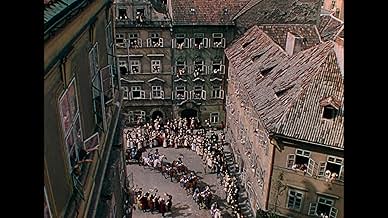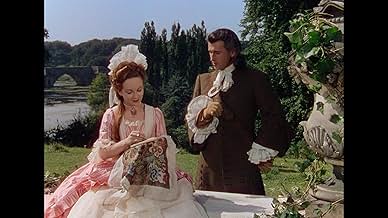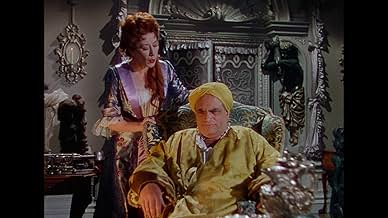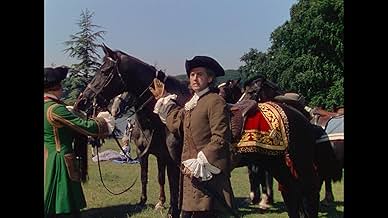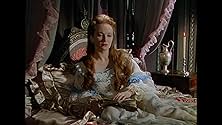CALIFICACIÓN DE IMDb
6.5/10
711
TU CALIFICACIÓN
Agrega una trama en tu idiomaYoung Sophie Dorothea marries Prince George Louis but it's far from a love match. Then she falls for Swedish Count Philip Christoph von Königsmark.Young Sophie Dorothea marries Prince George Louis but it's far from a love match. Then she falls for Swedish Count Philip Christoph von Königsmark.Young Sophie Dorothea marries Prince George Louis but it's far from a love match. Then she falls for Swedish Count Philip Christoph von Königsmark.
- Dirección
- Guionistas
- Elenco
- Nominado a 1 premio Óscar
- 1 premio ganado y 2 nominaciones en total
Françoise Rosay
- The Electress Sophia
- (as Francoise Rosay)
Opiniones destacadas
Terrific performances, excellent production values and superb color cinematography highlight this tale of court intrigue, forbidden love and murder. Saraband for Dead Lovers was mentioned by Stewart Granger as one of the few films of his that he was truly proud of, and it's plain to see why. He is terrific as Count Konigsmark, inventor of the famous Colichemarde sword that bears a version of his name, though that isn't even mentioned here. Flora Robson does a great job with a particularly juicy character reminiscent of Glenn Close's character in Dangerous Liasons. In fact, if you liked that film, you'll probably love this one. All the supporting cast are very good, especially Peter Bull and Anthony Quayle. Please someone restore this film and put it out on DVD. Kino? Anyone??
Saraband for Dead Lovers tells the tragic story of Princess Sophia Dorothea of Celle who married Prince George Louis of Hanover most unhappily. Her's is one of the saddest stories concerning royalty ever.
This may have been Joan Greenwood's finest performance on screen. She's really the only decent person in this entire cast. For reasons of politics, she's rushed into a marriage with George Louis and has two children by him, a boy and girl. At the time this is all taking place in the 1680s, there's no reason to suspect that these kids will be nothing more than the Electoral Princes of Hanover in the Holy Roman Empire.
But through their grandmother, played here by the indomitable French actress Francoise Rosay, they are descended from James I, the first king of the United Kingdoms of Scotland and England. She never lets them forget that for a moment.
Actually in fact a whole lot of people in 1689 would have to clear out of the way for Peter to become King of Great Britain. But over the next two decades, that's exactly what did happen. One thing the Hanover clan had going for them, they were firm Protestants and at that point there were too many people in Great Britain who had a vested interest in an unquestioned Protestant succession. It was the Hanoverian ace in the hole.
But before all these events occur Joan Greenwood falls head over heels for the dashing Swedish Count Philip of Konigsmarck as played by Stewart Granger. Granger probably plays Konigsmarck a lot better than he actually was, which was a military man who was not above a little bedroom politics to get what he wanted. Before becoming involved with the younger and more attractive Greenwood, Granger was providing a little nookie on the side to Flora Robson. Robson was the old mistress of the Duke Ernest Augustus played here by Frederick Valk, but the old girl wanted something a little livelier which Granger provided for a few favorable mentions. As in real life Granger moved away when he found something better and Flora reacted with the fury of a woman scorned.
Some of you might recognize a bit of Anna Karennina in this story and I wouldn't be surprised if Count Tolstoy took this story as inspiration when he wrote his epic classic.
Peter Bull and Joan Greenwood are the direct ancestors of the present monarch of the United Kingdom and her family. In 1715 Peter Bull became George I of Great Britain and distinguished himself by never learning to speak one drop of English. In fact all he saw Great Britain as was a cash cow to finance various continental Hanoverian ventures. But the little boy in this film grew up to be George II and so on and so on until Elizabeth II.
For what happens to lovers Granger and Greenwood you have to watch the film for. It's a story that the royals aren't exactly proud of.
This may have been Joan Greenwood's finest performance on screen. She's really the only decent person in this entire cast. For reasons of politics, she's rushed into a marriage with George Louis and has two children by him, a boy and girl. At the time this is all taking place in the 1680s, there's no reason to suspect that these kids will be nothing more than the Electoral Princes of Hanover in the Holy Roman Empire.
But through their grandmother, played here by the indomitable French actress Francoise Rosay, they are descended from James I, the first king of the United Kingdoms of Scotland and England. She never lets them forget that for a moment.
Actually in fact a whole lot of people in 1689 would have to clear out of the way for Peter to become King of Great Britain. But over the next two decades, that's exactly what did happen. One thing the Hanover clan had going for them, they were firm Protestants and at that point there were too many people in Great Britain who had a vested interest in an unquestioned Protestant succession. It was the Hanoverian ace in the hole.
But before all these events occur Joan Greenwood falls head over heels for the dashing Swedish Count Philip of Konigsmarck as played by Stewart Granger. Granger probably plays Konigsmarck a lot better than he actually was, which was a military man who was not above a little bedroom politics to get what he wanted. Before becoming involved with the younger and more attractive Greenwood, Granger was providing a little nookie on the side to Flora Robson. Robson was the old mistress of the Duke Ernest Augustus played here by Frederick Valk, but the old girl wanted something a little livelier which Granger provided for a few favorable mentions. As in real life Granger moved away when he found something better and Flora reacted with the fury of a woman scorned.
Some of you might recognize a bit of Anna Karennina in this story and I wouldn't be surprised if Count Tolstoy took this story as inspiration when he wrote his epic classic.
Peter Bull and Joan Greenwood are the direct ancestors of the present monarch of the United Kingdom and her family. In 1715 Peter Bull became George I of Great Britain and distinguished himself by never learning to speak one drop of English. In fact all he saw Great Britain as was a cash cow to finance various continental Hanoverian ventures. But the little boy in this film grew up to be George II and so on and so on until Elizabeth II.
For what happens to lovers Granger and Greenwood you have to watch the film for. It's a story that the royals aren't exactly proud of.
At a time when Britain was supposed to be flat broke and ordinary people were seemingly as monochrome as the movies they watched, Ealing Studios was churning out classics of all kinds. It's all reversed nowadays. In this case a beautifully crafted and intelligent Mills & Boon in Technicolor and, with my thanks to the knowledgeable commentary of theowinthrop written earlier, the added frisson of apparently being (almost) perfectly true.
Amidst the political machinations of the House of Hanover in its striving for the throne of England 300 years ago, a young and beautiful woman forced to be the wife of the boorish future King falls for a young and dashing Swedish nobleman, and vice versa. While a powerful lady of the court is also passionately in love with the soldier. As always befits our Betters they all know their duty – to power and money, much to the unhappiness of all those only in love. Although initially it may take a few minutes to get into the politics of another world, it's a mesmerizingly told tale with solid emotional acting moving through some colourful luxurious sets and alternating between intense romance and somber intrigue, even a little swash. Of the main stars Stewart Granger was seldom more er masculine and although Joan Greenwood was even more wishy washy than usual it was perfectly played and believable. One thing: did Sophia's letter to her son ever get delivered?
It might be more of a hit with the ladies, but gents too should enjoy it, with or without hankies.
Amidst the political machinations of the House of Hanover in its striving for the throne of England 300 years ago, a young and beautiful woman forced to be the wife of the boorish future King falls for a young and dashing Swedish nobleman, and vice versa. While a powerful lady of the court is also passionately in love with the soldier. As always befits our Betters they all know their duty – to power and money, much to the unhappiness of all those only in love. Although initially it may take a few minutes to get into the politics of another world, it's a mesmerizingly told tale with solid emotional acting moving through some colourful luxurious sets and alternating between intense romance and somber intrigue, even a little swash. Of the main stars Stewart Granger was seldom more er masculine and although Joan Greenwood was even more wishy washy than usual it was perfectly played and believable. One thing: did Sophia's letter to her son ever get delivered?
It might be more of a hit with the ladies, but gents too should enjoy it, with or without hankies.
With most of the reviews here rating the film at 8 and above, the overall score of 6.6 seems to indicate an unreasonable bias in favour of the sort of reviewer who thinks that 'cack' is a useful characterisation of this masterwork, or who superciliously thinks that perhaps film students could just admire the brief technical mastery of the montage sequence - which is indeed brilliant editing - but who then dismissively junks the rest of the film.
Actually, most of the reviewers here actually do ample justice to a production which excels in all departments, and succeeds in being a romantic film which balances passion with such intelligence that a powerful and moving tragic sense is conveyed of real people trapped in a world of inhuman artifice and formality. I think Dearden's work here has a powerful impact that is at least the equal of David Lean's later epics. It also often even reminded me of the sad fate of Kubrick's Barry Lyndon, like Koenigsmarck the commoner victim of a cruel aristocratic world, the reality of which is portrayed without illusions.
So why the poor overall rating? This really can't be justified, or tolerated, and I must be particularly lavish in my praise to help raise it up towards something nearer to it's true worth.
Once again, here in Britain, it was only thanks to the ever-excellent 'Talking Pictures TV' that we got a chance to see this neglected masterpiece at all. Really the general churlishness of modern neglect towards this utterly magnificent film is very hard to fathom.
Perhaps it is merely the jealousy of mediocrities who can never hope to grasp or emulate such an intelligent movie, in which the historical background is correctly but lightly established, or to command such a superbly well-constructed portrait of passion and intrigue in high places. In Britiain we seem to have developed an aversion to a past so often sweepingly dismissed as both hopelessly outmoded, as well as politically irredeemable, by an influential cultural cabal that wants to sweep away the inconveniently substantial achievements of earlier generations, which they find so uncongenial to their own doctrinaire, yet strangely insecure and intolerant ideals.
Objectively, the direction, screenplay, acting, costumes, set, camera-work and general mise-en-scene are of an uniformly high standard. Only a philistine, or a doctrinaire but shallow cineaste who feels threatened by having the grand achievements of his parent's and grandparent's generations, as it were, looking over his shoulder, could possibly dismiss such a magnificent and effective film. Some fellow-travellers of both regrettable tendencies seem to be sitting in judgement of this fine film here, but not enough of them to relegate it to a miserable 6.6, surely?
Actually, most of the reviewers here actually do ample justice to a production which excels in all departments, and succeeds in being a romantic film which balances passion with such intelligence that a powerful and moving tragic sense is conveyed of real people trapped in a world of inhuman artifice and formality. I think Dearden's work here has a powerful impact that is at least the equal of David Lean's later epics. It also often even reminded me of the sad fate of Kubrick's Barry Lyndon, like Koenigsmarck the commoner victim of a cruel aristocratic world, the reality of which is portrayed without illusions.
So why the poor overall rating? This really can't be justified, or tolerated, and I must be particularly lavish in my praise to help raise it up towards something nearer to it's true worth.
Once again, here in Britain, it was only thanks to the ever-excellent 'Talking Pictures TV' that we got a chance to see this neglected masterpiece at all. Really the general churlishness of modern neglect towards this utterly magnificent film is very hard to fathom.
Perhaps it is merely the jealousy of mediocrities who can never hope to grasp or emulate such an intelligent movie, in which the historical background is correctly but lightly established, or to command such a superbly well-constructed portrait of passion and intrigue in high places. In Britiain we seem to have developed an aversion to a past so often sweepingly dismissed as both hopelessly outmoded, as well as politically irredeemable, by an influential cultural cabal that wants to sweep away the inconveniently substantial achievements of earlier generations, which they find so uncongenial to their own doctrinaire, yet strangely insecure and intolerant ideals.
Objectively, the direction, screenplay, acting, costumes, set, camera-work and general mise-en-scene are of an uniformly high standard. Only a philistine, or a doctrinaire but shallow cineaste who feels threatened by having the grand achievements of his parent's and grandparent's generations, as it were, looking over his shoulder, could possibly dismiss such a magnificent and effective film. Some fellow-travellers of both regrettable tendencies seem to be sitting in judgement of this fine film here, but not enough of them to relegate it to a miserable 6.6, surely?
This is one of the most beautifully made Technicolor melodramas of the 1940's which loses nothing in maintaining historical accuracy. Look out for simply stunning performances from Peter Bull as the heir presumptive to the British throne and, above all, Flora Robson as Countess Platen. Stewart Granger (Konigsmark) is in top form and Francoise Rosay as the Electress Sophia is unforgettable. Dialogue is razor sharp throughout, the costumes are splendidly authentic and the sets are magnificent. The only area of weakness is Joan Greenwood's Sophie Dorothea, but she is supposed to be playing a tragic victim and maybe that's why critics wrote her off as a wet lettuce. It is much to be regretted that Saraband is not more widely available.
¿Sabías que…?
- TriviaThis was the first Ealing Studios movie to be shot in colour.
- Citas
Konigsmark: There are four of us. My sisters have been liberal with their favours in half the courts of Europe. My brother was tried for murder in England. As for me, I'm no better than the others. There's something in our blood that makes us worthless... for anyone one.
- Créditos curiososOpening credits prologue: FROM a Germany that was then a collection of small and independent States, GEORGE LOUIS of Hanover succeeded to the throne of England. As KING GEORGE the FIRST he left behind him a prisoner in the CASTLE of AHLDEN - - a woman whose name he tried to obliterate from the pages of history, whose story he determined should die with her. It was the story of the woman who had been his wife......SOPHIE DOROTHEA.
- ConexionesReferenced in Introducing Ealing Studios (2012)
Selecciones populares
Inicia sesión para calificar y agrega a la lista de videos para obtener recomendaciones personalizadas
- How long is Saraband?Con tecnología de Alexa
Detalles
- Tiempo de ejecución1 hora 36 minutos
- Color
- Relación de aspecto
- 1.37 : 1
Contribuir a esta página
Sugiere una edición o agrega el contenido que falta

Principales brechas de datos
By what name was Zarabanda (1948) officially released in India in English?
Responda
